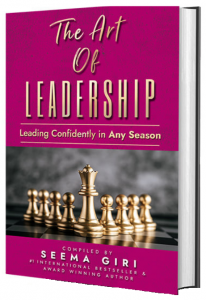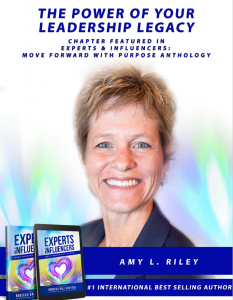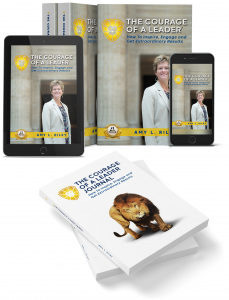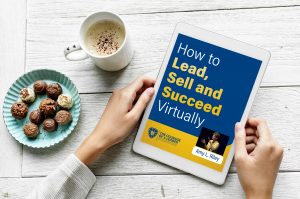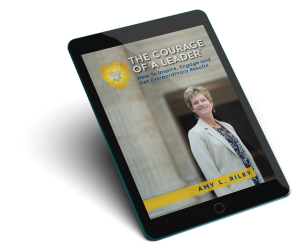My guest today has made herself a thought leader in the area of hybrid work. She has been a step ahead of most in the marketplace asking herself the questions for the next phase of work – always with an eye on caring for employees and clients.
You’ll enjoy hearing from and learning from Gloria Everett, President and CEO of The Mutual RRG.
About the Guest:
Gloria H. Everett President & Chief Executive Officer
Gloria has more than 35 years of experience in insurance risk management, sales, marketing and management, including over 20 years of experience in medical professional liability insurance with The Mutual. Before joining The Mutual, Gloria held key leadership roles at TIG/Fairfax, Fireman’s Fund, NORCAL Mutual Insurance Company and Kaiser Permanente. Gloria has served on multiple Boards including Pacific University, National Risk Retention Association (NRRA), the UC Berkeley, Equity & Inclusion Advisory Board and Medical Professional Liability Association (MPLA) formerly the Physician Insurers’ Association of America (PIAA), where she served as Chair of the Board from 2014 – 2016. Gloria was the recipient of the 2019 MPL Association Award of Excellence in Honor of Peter Sweetland.
Gloria holds a Bachelor of Arts degree from Saint Mary’s College in Health Services Administration.
https://www.linkedin.com/in/gloria-everett-b247924/
https://www.tmrrg.com/About/management.aspx
About the Host:
Amy L. Riley is an internationally renowned speaker, author and consultant. She has over 2 decades of experience developing leaders at all levels. Her clients include Cisco Systems, Deloitte and Barclays.
As a trusted leadership coach and consultant, Amy has worked with hundreds of leaders one-on-one, and thousands more as part of a group, to fully step into their leadership, create amazing teams and achieve extraordinary results.
Amy’s most popular keynote speeches are:
The Courage of a Leader: The Power of a Leadership Legacy
The Courage of a Leader: Create a Competitive Advantage with Sustainable, Results-Producing Cross-System Collaboration
The Courage of a Leader: Accelerate Trust with Your Team, Customers and Community
The Courage of a Leader: How to Build a Happy and Successful Hybrid Team
Her new book is a #1 international best-seller and is entitled, The Courage of a Leader: How to Inspire, Engage and Get Extraordinary Results.
https://www.linkedin.com/in/amyshoopriley/
Thanks for listening!
Thanks so much for listening to The Courage of a Leader podcast! If you got inspired and/or got valuable leadership techniques you can use from this episode and think that others could benefit from listening, please share using the social media buttons on this page.
Do you have questions or feedback about this episode? Leave a comment in the section below!
Subscribe to the podcast
If you would like to get automatic updates of new The Courage of a Leader podcast episodes, you can subscribe to the podcast on Apple Podcasts. You can also subscribe in your favorite podcast app.
Leave us an Apple Podcasts review
Ratings and reviews from our listeners are extremely valuable to us and greatly appreciated. They help our podcast rank higher on Apple Podcasts, which helps us ignite The Courage of a Leader in more leaders! Please take a minute and leave an honest review on Apple Podcasts.
Teaser for next episode
Come back September 20 for “Easy and Accessible Ways to Retain Top Talent” by Mary Lynn Fayoumi, the CEO of HR Source.
Transcript
My guest today has made herself a thought leader in the area of hybrid work. She has been a step ahead of most in the marketplace, asking herself the questions for the next phase of work. always with an eye on caring for employees and clients. I'm so glad that you are here to hear from and to learn from Gloria Everett, the President and CEO at the mutual
Amy Riley:Welcome to the Courage of a Leader podcast. This is where you hear real life stories of top leaders achieving extraordinary results. And you get practical advice and techniques, you can immediately apply for your own success. This is where you will get inspired. And take bold, courageous action. I am so glad you can join us. I'm your host, Amy Riley. Now, are you ready to step into the full power of your leadership and achieve the results you care about most? Let's ignite the courage of a leader.
Amy Riley:Gloria, I know early in our journey with COVID 19. You accepted that flexible virtual work was going to be here to stay. And you started planning and operating as if that was the case? How were you able to make that decision? How did you come to that? Because honestly, so many people were like, we're gonna get back to normal really quick. Yeah,
Gloria Everett:involved in the wildfires of:Amy Riley:It didn't Yes.
Gloria Everett:Yeah. So everybody
Amy Riley:thought this was two weeks,
Gloria Everett:I guess two weeks left, you know, that's gonna be it. And we'll all be back to after two weeks, we still didn't know much. We still you know, we didn't even know how we were going to be gathering the clinical data on this. And I could I could hear from the physicians in the field. I could see what things were being done. I pulled a lot from the tech world because we're at Cisco Bay Area. Yeah. So I looking for information from the day we went out. My number one concern was how are we going to go back? You know, how are we going to come to go back and then as we I studied this If I kept asking questions, it became evident that no one had answers. No. Mm hmm. So I just had to keep an open mind. Are the are the employees safe? Do they have the equipment they need? As the months and weak as the weeks and months went on? In this case? I kept asking myself, How are you going to explain to them why you're going to bring them back? Yes, the why became the issue. Enough to, in the San Francisco Bay Area, start looking for consultants. And I think that to me, was probably the biggest positive that I did is I found my audience, and they spent more time with me, because I'm a baby boomer, and I was trained as you were evaluated by the time that your bottom was in the chair. Yes. And you were processing work. And I had that in my head still, of course. And they said that is you didn't have to get rid of that. But it was hard. Because how so then it was like, how do we set up criteria to make sure that our clients are being serviced? Yeah. How do we set up metrics to evaluate people? Mm hmm. All of these little tidbits. So my full time other than running the company making sure we were doing what we needed to do was trying to answer this question. Yeah. More I dove into it, the less I knew.
Amy Riley:Yes. Yeah. Well, and you just shared a lot of value Gloria, even in the journey that you took. Alright, so first, you had this plan to get folks out of the workplace? Right, then the focus goes to all right. Now my workforce is scattered about in their homes. Are they safe there? Do they have the equipment and the resources that they need? Right, and I like you were looking to other industries, the tech industry, looking to experts in the field? What do I need to know? How can I get the answers? And you are once many years ahead of of other leaders looking at this? keeping an open mind throughout, right, and then thinking about, okay, if we're going to ask employees to come back into the office for any amount of time, why are they proven that they can do their work from home? What Why do you need to come in? And I know from our previous conversation, scoring, that you've made some investments in making sure that folks are safe and comfortable in their home offices, right. So you've set us up to do well here? Why do we need to come back in there? And are the clients being served? Right? And how do we evaluate performance? So a lot of different places that you were looking along the journey?
Gloria Everett:You know, that that's just kind of how it all evolved. And I think that the more that you start asking these questions, and I think for me, you know, talking to my peer group, getting talking to the consultants talking to other industries, it was really an aha moment when I'm hearing from them. Well, you know, we need to cut vacation pay because everybody's working from home, we need to, you know, we need to, in essence, start taking away because the privilege of working from home, you don't have commute costs, you don't have this, you don't have that, you know, all those. The consultant that I used, said something so profound to me, said, well, now we're in the situation, and even Yes, all that conversation is going on for some people. And those are questions you need to ask. You really have now just made your company, the center of their personal lives. You have dropped your company? Uh huh. The domestic space? Yes, all of your employees like it either way. So you need to couch that. While I don't have to commute anymore. Well, I can kind of be very flexible with my hours. But they never get a break.
Amy Riley:Yes. Yes. And so
Gloria Everett:how are we going to maneuver this? And to me that was so valuable, because I had never thought about that. So the issue Yeah, they don't have to commute in yes, they can pick up their children from daycare, or they can go take medications to their elderly parents or they can do whatever they need to do and don't want a load
Amy Riley:of laundry. Yeah, absolutely. But you know, they don't get a break either. Yeah, yeah. I'm in the home.
Gloria Everett:So that to me was a huge aha. I think for me also, one of the things I did worry about and I did see starting to deteriorate was the issue of culture. And the issue of teamwork. And the issue of how do you onboard new employees? How do you transfer that? In a virtual world?
Amy Riley:ed as chair of the board from:Gloria Everett:What have I learned? It's dynamic and ongoing. And no one has white, no one was it right? I think the most exciting part of it is I'm, I'm challenged. Again, I mentioned my demographic baby boomers, you know, I was training management by walking around, I was trained by, you know, how many hours have somebody stayed out additional hours, even if they were just moving paper clips on their desk? They were revered as being you know, a really hard worker putting
Amy Riley:commitment. Yeah,
Gloria Everett:exactly. And you have to put all of that aside and go. But that doesn't apply in this environment. So how are we going to make this happen? And taking a Component and Component? And I think my personal leadership philosophy is people are your most important asset. Yeah. And it's the people that can make magic. We can all build widgets, we can all write insurance policies. But it's the passion behind what you're doing. That makes the magic. Yeah. And so how do we transfer that? We happen to be in medical professional liability insurance, a very important part to our health care delivery system? Yes. It's also what I believe empowering our physicians and providers to go to work every day and not concentrate us on are all my financial assets and reputation on the line. They need to feel comfortable that we have their back. And they need to feel comfortable that when they have a claim that we are going to guard they're not only financial well being but their emotional well being. If anybody has been in litigation, you will know it is the worst thing in the world. It's adversarial, mean, nasty words are sad. So knowing that we could be there to embrace the physicians when they're going through this very horrific event. Yeah, it's our culture. And how do you how do you communicate that and build that with everyone across all the disciplines of the company? Yes. So my idea was to pull everybody together once it was safe, or as safe as we knew it would be because there's always variation in the virus and have these conversations Nice. I mean, the speed really up front. Yeah. Oh, surprise. We we were out two years to the, almost to the day that when we had this, well maybe you know, we were out for a significant amount of time, the amount of anxiety that was around, are she is she going to make me go back to work? Is she going to make me do this issue? And I'm like, No, we're going to do this together? Yeah, we don't know, we don't really know what this looks like. But I have no indication right now that no one's doing their job. Like we would have, it would have been self evident. But what I do see is this, and we have ways of monitoring is that people do create flexibility in their schedule. Because some people were like, do I have to sit at my desk can stare at it, if I don't have anything to sit at my desk and stare at right now. And I say, Whoa, but if you have to run an errand, or you have to just show respect for the other people that may say, Listen, I'm going to be on my cell phone, I need to run an errand. And make sure your work is done. So maybe when your significant other takes the kids out on an outing or or somebody has your kids for a couple hours on it on a weekend. You've finished what do you ever have for the week? Yeah, but that's, you're a professional, you have to make those calls. Yeah. So I think that to me, is really important. Is that Yeah, really understand they're professionals and get your job done. But we need to come together.
Amy Riley:I yeah, I want to underscore this glory, because I think this is so critical. You're you're talking about the the given the take and the co creation, and the trusting one another. There is no one size fits all solution here, there's a lot of unclear answers, I think something that is clear, is that we need to co create with you if you're a leader, with your team, members of your CEO with all the employees of your organization, right, we need to we need to hear from everybody about what works for them individually, and in their teams, and CO create here.
Gloria Everett:I think that's the perfect word. And that is exactly what we're trying to do is we're trying to co create No, but I certainly don't have all the answers, but together we will find them and what we find my work until we get more information. And it's it's almost like a ladder, you know, you keep going up this ladder and figuring it out. So I think that is the really exciting part of this. You know, it being you know, from you know, coming in when women weren't even in the boardroom to, you know, women weren't even. I mean, you were a teacher, a nurse, or a secretary, those are your three options. And being the I think the generation that kind of broke, that was initial ceilings. To where we are today. It's like mind blowing. Because you, you You did what your boss told you to do, even if you thought it was and the phrase was I don't you know, I mean, this was a phrase that was used, I don't pay you to think I'm gonna pay you to do where today co creation is really what you have to do to maintain a strong healthy workforce.
Amy Riley:Yeah. Yeah. Agreed. Agreed. So how do we keep teams collaborating? If they're not together in the office, day to day?
Gloria Everett:That was that's ultimately where we ended up going. And I said, we are going to go back one day a week. Okay. A full day, it's going to be non commute hours is going to be from 10 to two.
Amy Riley:Oh, okay. So so that's different. I had heard that from many folks in the office, but it's not nine to five, it's
Gloria Everett:10 to two an hour of that is we all have lunch, and the Lunch is provided. Wow. Okay. And some people like to do an activity like an educational thing on a certain topic that may be of interest to all of us. Yeah. And you know, we they've done Jeopardy. They've done all kinds of different kinds of educational formats, and it's really fun and there have been prizes at times and people really creative. One. A group of people for every meeting is responsible for Selecting the cuisine, and selected if they want an activity or not, or kind of a theme, you know,
Amy Riley:nice and that responsibility is rotating it through the whole
Gloria Everett:come down. Okay. So that's really exciting. And what I have, people are saying, well, you know, we're coming in and maybe we should mandate, you know, nine to five. I said, No, let's let this grow organically. Nice. Nice. And some people said departments go well, before in from like, 10 to two on Wednesday, which happens to be the day right now. Maybe we should come in on Thursday to do our little team department things. Okay. And that worked for a while. And then they realized, well, maybe that doesn't work, maybe we should just add on ours to the to the to. So again, stability, flexibility, and then figuring out what works for them.
Amy Riley:I love it, Gloria. Because if you had said, You know what, this is going to end up that we need two or three days a week in the office. And you had mandated that from the beginning. People, people were likely to resist, you let them learn from these experiences. Because honest to goodness, we have forgotten. We have forgotten what it feels like to be in the office all day. Right? And we forgot what benefits or how that affected us. And it might be affecting us differently, because we've all experienced what we've experienced over the past couple of years. So you come in and and try it.
Gloria Everett:Yeah, just open the door to the closet and hope the boogeyman you know, is in the beginning wasn't there? We also had an interesting we also had some feedback with okay. The one day a week well, I can't get any work done, because I'm going in the office. Interesting. So their normal road processing work got interrupted Am I said? Exactly. Yeah, because that is what we want. Because this is the designated time to talk to your teammates. It's the time to work on collaborative projects. It's the time to ask face to face questions. It's the time just to come together. And it will disrupt. It's meant to be it's meant. So I think they got it now. And they're like, Well, we're just coming in and having lunch and kind of talking to each other. I said, Exactly.
Amy Riley:That's great. Gloria. Yes. It's meant to disrupt. Yeah. I love that.
Gloria Everett:Because we would if we were coming in nine to five every day, it would be interspersed throughout the day, on seven days a week. Well, no, now it's very focused. And I think because we focused on it, people were wanting Wait a minute, wait a minute. I think the other thing that was really interesting, again, another little observation is that certain disciplines have to have more time together. Yes. And this is across the board in the NPL world or in the insurance world, it seems like times of year, there's a seasonality to some departments, you know, there could be finding the times the financials need to be prepared that people it's just easier to come in together and everybody look at spreadsheets. Thing is, there's contracts, there's contract renewals, or there's policy issuance times, or there's, there's just certain things that lend itself to spending more time in the office. So there's no restriction and coming into the office, and certainly, anybody not feel safe at home, I would want them to come into the office, I would want them to have that separation. Now, you know, um, maybe making a mountain out of a molehill because you know that those are kind of difficult things to talk about. But sometimes mom maybe just needs to get away from the kids and get some work done. You know? Yes, there are times that I'd like to just get away to, and I don't have any kids at home. But you know, after a while, we just need kind of a change of scenery. Yeah. So
Amy Riley:maybe it's summertime. Some parents are spending more time in. Exactly. Personal seasons, and professional seasons. Whoa, I love that. And we had this Abin flow before, and maybe it just feels more distinct or contrasted now, or there might be times where we need more collaboration with our team. So that team is collectively deciding, let's spend some more hours in the office while we're launching this or having this season or signing the contracts. Yeah,
Gloria Everett:yeah. And then the other thing that was another kind of side. A wholeness was there were people that decided they wanted to get together purely for social. So they would take their breaks, those that lived in the same community would meet up and go for long walks and a walking group.
Amy Riley:And they had the office
Gloria Everett:like not in their neighborhood, in their in their area close by. And they would. And I think this was particularly helpful when being in closed areas was was more of a concern with the virus. Yeah, so they saw this wide. And that seems to be going strong, because I hear that all the time, I'll be talking to someone that will are walking people or meeting tomorrow, I'll run this by them. So I think there's a lot of different ways to make this happen. I just don't think in terms of the great resignation, in terms of the workforce that we're coming up with. That we have to be flexible, and we have to it as leaders, we need to challenge ourselves to figure out okay, how are we going to make our make our metrics? How are we going to know things are getting done? That's on?
Amy Riley:Nothing well said. Well said. Yeah, great perspective. Yeah, I love that you're speaking to what it's calling from you, personally, to stay open minded, and flexible, as the leader, and to continue to do so. Because as you've said, You're exactly right. This is dynamic. This is evolving. What's working right now might not at all be what's going to work six months from now. Yeah,
Gloria Everett:but more will be revealed.
Amy Riley:Yes, so anything you can offer Gauri about your personal journey with that, like, what do you what do you do? How do you how do you stay open minded, flexible, continually looking?
Gloria Everett:You know, I have great group of industry peers, I, I read a lot about this subject. I am curious. And I also talked to my children who are the demographic, okay. I encourage my leaders to talk to their children. And one of the questions is, if you were if your daughter or son, who's now been working at home for two years was made to go back in the office, what do you think they would do? Or they wouldn't do it? So why do you think the people that work for us? I'm gonna do it? Because it's going to make us happy? Oh. Nine, I leave at five. Yeah, no, it's
Amy Riley:I love that. Gloria, what would my kids do? You know, don't have kids, you know, what, what would your nieces and nephews do? Right? Well, if somebody you know, in that, in that in a generate in that demographic. Oh, it's speaking to your industry, industry peers reading? Yeah, I just see you're, you're constantly scanning.
Gloria Everett:Gloria. Absolutely. And again, I've had great consultants that I've used in a lot of personal growth in this area again, you know, I was, I was the one that had to be convinced, because it wasn't all for me. But getting back to, you know, your people are your biggest asset. And they're the ones that are going to make the magic happen. They're the ones that are going to make, you know, the mission and vision come to life. They're the ones that are face to face with your client. They're the ones that have to believe you. And the only way you can do that is coming together. So if we read memos in our career, and we went, who were they writing about? This? Isn't our organization.
Amy Riley:Real? Yes. Okay. So yeah, you keep your eye on that idea that the people there who make the magic happen. So that commitment to having it work for people and not involve them if it's going to work for people, and that there's going to be moments, leaders or leaders that this is going to feel uncomfortable.
Gloria Everett:Yes, very uncomfortable at times, almost like I don't know, I don't feel very secure right now. Can somebody help me? It's a different world. It is different and we're not going to go back. We can't. We can't. There's just so And the box has been opened. Yep. And I have all kinds of questions about what's going to happen to the workforce. And I feel for those people, like my insurance, they can't deliver medicine but in person, right. So the our grocery clerks, our nurses, our doctors, our teachers, as much as the teachers, at some point have to be in front of the student. And there's just a whole bunch of questions around. How's this gonna look in the future?
Amy Riley:Mm hmm. Yeah, there are? Yeah. There are a lot of questions in front of us, but I'm hearing, you're saying, Get your people together, and ask those questions. Absolute or the possible answers. So
Gloria Everett:yeah, and the other thing I think we did, which was really interesting, getting back to the initial days, and how to, you know, when when we couldn't go in the office, or when we did we were under such heavy restrictions, to be able to contain the virus? And was, um, people didn't mean, I had heard that people were working off of their kitchen tables. Yeah. We did not know that. Yeah, this was not a good thing. I had heard that people were, you know, kind of in this corner of the room, and you know, children are home because there's no school and everything. So we, as a leadership group made the commitment that we would have, each and every employee have a ergonomic evaluation, or love this virtual ergonomic specialist. And the thing that I thought was really unique to the oh, you know, the specialist is going to put down all this equipment they need. It was so de minimis, the amount of money we spent to get everything ergonomically up to date. So it was nothing. I mean, what it was, but it was nothing compared to the value with the employee brought to the table.
Amy Riley:Lovely. Yes. Yes. Be comfortable and setup as fast as possible. At home. Oh, yeah.
Gloria Everett:I mean, yeah. did have the setup correctly? Did they have a space that made sense? You know, it was, it was a very trying time not to say that it's over over. Right. But I think know more about the virus we know about more about our capabilities. And we know what we don't we know that we have questions about the future. Yes.
Amy Riley:Yes. Yeah. I'm glad you brought that up. Cuz you shared that with her earlier. And I think that was such a, a wise decision, it follows your journey, right? Like, first, we were safely getting everybody out of the office. And now you're making sure that things are safe in this dispersed setup.
Gloria Everett:I think that that's kind of where we are.
Amy Riley:Going, you also earlier brought up the challenge of onboarding new employees associates during this kind of setup. Any anything to offer there? What lessons learned?
Gloria Everett:Number one is you do need to come together and spend time in a physical space that has a corporate feel to it, you can't. What are the people that we've onboard since then they did come in the office, they met with their supervisor, they met with leaders, and could see the structure of what used to be, you know, and that was really important. The other thing is, don't underestimate people's ability to learn. And, you know, and don't underestimate that the as maybe some silly mistakes will be made. But you know, what, we're all learning. We're all learning. So, I think that just again, being flexible, really understanding what the person you're onboarding needs, you know, and evaluating, again, having a great leadership team that's tuned into this, but you do need to come together. This, I do believe that you can 100% onboard have somebody up to speed virtual, you know, somebody may argue with me, but that's not been my experience.
Amy Riley:Okay. So there is there is a come together, but also don't underestimate their ability to learn, right without having somebody looking over their shoulder the entire time. Yeah. Yeah.
Unknown:Yeah. So it's, you know, you hire the right people, and they'll be fine.
Amy Riley:Gloria, you have shared such great stuff with us today. I really believe you are ahead of the curve. In looking at how do we make virtual and hybrid work for us for the work for our customers, and you do such important work for the physicians that you serve. And a huge theme I'm hearing from you is people, the people who make the magic the service that you provide happen. So how do you have it work for people? Involve them in the conversations, have that given take hear from them firsthand about what does work.
Gloria Everett:I love your word. cocreate.
Amy Riley:Yeah, terrific. Gloria, thank you so much for being with me today and sharing candidly of your of your experience. And the Mutual's experience.
Gloria Everett:Thank you, Amy.


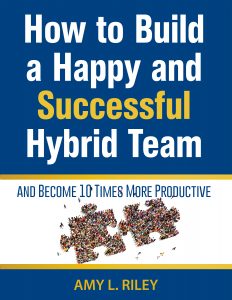
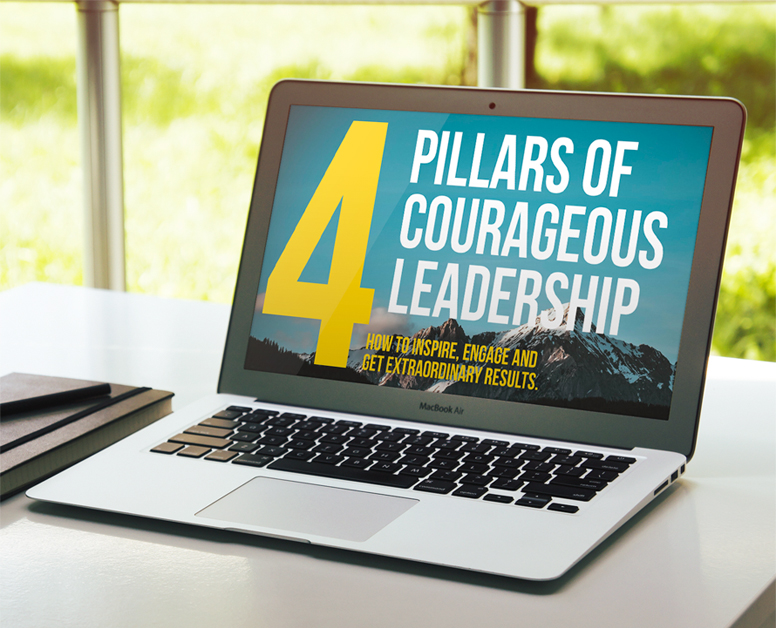 A Summary of The Courage of a Leader® 4 Pillars
A Summary of The Courage of a Leader® 4 Pillars